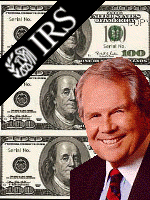 |

|
|
to Your Local Churches Illegal Clerics' Tax Exemptions |
| Compiled by Badpuppy's GayToday From Americans United Reports
The information communicated to the ministers—printed below-- can be used by activists in many locales. It effectively warns ministers not to violate church/state separation by passing out the violating voter's guide next Sunday preceding election day on Tuesday, November 3rd. Such a violation, they explain-- promising monitors in their congregations—pose a serious threat to the tax-exempt status of any offending church. A letter written by Americans United Executive Director, Barry Lynn can be shared with ministers in your neighborhood or city: Dear Religious Leader: The Christian Coalition, a national political organization founded by television preacher Pat Robertson, is conducting a nationwide campaign to distribute "voter's guides" in houses of worship in time for November's elections. After carefully studying Coalition voter's guides from previous years, I am convinced that they are in fact partisan campaign literature that advocate the election of certain candidates and the defeat of others. Independent scholars have reached the same conclusion. I am a Christian minister, and I believe in the right of religious leaders to speak out on moral and social issues. But houses of worship should be beacons of truth, not cogs in a partisan political machine. Distribution of Christian Coalition voter's guides in your church could raise serious tax issues. In 1996 two highly regarded Washington tax attorneys, one of whom was formerly chief of the Exempt Organizations Ruling Area at the Internal Revenue Service, prepared a memo warning churches about the distribution of slanted voter's guides. Last February, attorney David C. Gibbs Jr. of the respected, conservative Christian Law Association issued a similar warning at the National Religious Broadcasters meeting in Washington, D.C. The Christian Coalition has a long track record of partisan activity. In fact, based on material supplied in part by Americans United for Separation of Church and State, the Christian Coalition is being sued by the Federal Election Commission (FEC) for illegal political activity. The FEC alleges that the Christian Coalition conducted its activities in conjunction with the campaigns of particular candidates. You should also know that Robertson's Christian Broadcasting Network recently had its own tax-exempt status pulled retroactively by the IRS for illegal political activities. It's clear Robertson and his attorneys don't understand tax law themselves and are in no position to advise you on the matter.
The penalty for violating the IRS Code may include loss of tax-exempt status. The bottom line is that houses of worship that distribute Christian Coalition voter's guides run the risk of having their tax-exempt status challenged and possibly revoked. I urge you, therefore, to refrain from distributing Christian Coalition voter's guides or any partisan campaign literature during this election season. If you have questions about religious groups' involvement in politics or the provisions of the IRS Code, please feel free to contact me. Sincerely, Barry W. Lynn Executive Director Americans United : http://www.au.org/ A Legal Analysis The following legal analysis was prepared at the request of Americans United for Separation of Church and State by Milton Cerny and Albert G. Lauber, Jr. The authors are partners in the law firm of Caplin & Drysdale, Chtd., in Washington, D.C. Mr. Cerny was formerly Chief of the Exempt Organizations Ruling Area at IRS and Technical Advisor to the Assistant Commissioner, Employee Plans and Exempt Organizations. Mr. Lauber previously served as Deputy Solicitor General in the Department of Justice, with principal responsibility for litigating tax cases before the U.S. Supreme Court. Both have written extensively on the issue of nonprofits and electioneering activities. URGENT MEMORANDUM FOR CHURCHES CONCERNING DISTRIBUTION OF "VOTER GUIDES" IN 1998 CONGRESSIONAL ELECTIONS Under §501(c)(3) of the tax code, charities are absolutely prohibited from intervening in political campaigns by endorsing or opposing candidates for public office. This bar against campaign activities applies with full force to churches. There is no Supreme Court authority, under either the Religion Clauses or the Free Speech Clause of the First Amendment, that confers on churches a blanket exemption from tax-law requirements, such as the prohibition against political intervention, that apply even-handedly to churches and other charities. IRS rules permit charities, including churches, to engage in nonpartisan voter education activities. As Election Day approaches, various groups may ask churches to distribute "voter guides" to their members, contending that this is a permissible form of voter education. The groups preparing these voter guides may include the Christian Coalition, founded by television preacher Pat Robertson, and other organizations. Churches should approach distribution of these voter guides with extreme caution. Before agreeing to distribute a voter guide prepared by another organization, a church must ensure that the guide is truly nonpartisan and does not endorse or oppose any candidate, either explicitly or by implication. It does not matter that the church may not intend any political intervention. The IRS and the courts do not look to the church's motive, but to whether the voter guide in fact favors one candidate over another. Election activity by charities, including churches, continues to be a subject of intense IRS interest. The IRS has stated that it will have "zero tolerance" for violations, noting that the law "prohibits all forms of participation or intervention in any political campaign," even if the charity's involvement is "subtle" or "inadvertent." The IRS National Office in Washington recently advised regional IRS offices to develop new audit projects focusing on electioneering by non-profits. The consequences of an IRS audit can be severe, including loss of the church's tax exemption and ability to receive deductible contributions, as well as monetary penalties against the church and its officials. The IRS clearly intends to make good on its warnings. Last March, the Christian Broadcasting Network -- another group founded by Pat Robertson -- announced that it has agreed to IRS sanctions for its past violations of the election rules. Under this agreement, CBN's tax exemption was revoked for two years in which it violated the ban on campaign intervention, and three CBN affiliates lost their tax-exempt status permanently. CBN also had to pay a significant fine and agree to add outside individuals to its board of directors. In the last few years, several other charities have lost their tax exemptions for making implied endorsements of political candidates. The IRS is now actively litigating an important case against a church that had its exemption revoked for political activity in the 1992 campaign. If a church distributes a partisan voter guide, it will constitute improper political activity by the church, even though someone else prepared the guide. The IRS will examine all aspects of voter guides for signs of bias, including the array of questions presented, the size of type used for different candidates, and the photographs of candidates themselves. Thus, it is essential that churches consult their legal advisors and carefully review any voter guide before agreeing to distribute it. The fact that the Christian Coalition prepared a voter guide provides no assurance on this score, because its voter guides do not have to be nonpartisan. The Christian Coalition is not a § 501(c)(3) charity, and IRS rules thus allow it to engage in some political activity, such as disseminating voter guides that endorse or oppose candidates. By contrast, IRS rules absolutely prohibit a church from distributing a partisan voter guide. In the past, the Christian Coalition has reportedly withheld distribution of its voter guides until the last Sunday before the election. Disseminating the guides so close to the election maximizes their impact, but also makes it difficult for candidates to respond if they think their views have been misrepresented. This mode of distribution could jeopardize a church's tax-exempt status because it may prevent meaningful review of the guide's contents before it is disseminated. Unless a church's legal advisors are given sufficient time to review the voter guide in advance of its distribution, the church will have no way of knowing whether the guide is truly nonpartisan and thus permissible for it to distribute. The Christian Coalition has not as yet distributed its voter guides for the November 1998 election, and in past years it has refused requests to release them more than a few days before Election Day. Thus, it is not possible to advise pastors now whether these guides will comply with IRS requirements. The Coalition's publication of voter guides in prior elections, however, counsels careful scrutiny of the November 1998 guides when they finally appear. The Federal Election Commission has determined that the Coalition improperly engaged in partisan political activity when distributing voter guides during the 1990, 1992, and 1994 campaigns. Litigation on that subject is now pending in federal court. The Christian Coalition contends that its voter guides are nonpartisan because they do not expressly endorse candidates and are based on candidates' responses to questionnaires. In fact, the tax rules are not so simple. A voter guide may implicitly favor a candidate even though it does not tell people how to vote or evaluate candidates with "plus" or "minus" signs. The overall content and presentation of the guide must be considered in order to determine whether it is even-handed, neutral, and objective in portraying candidates' positions. If a voter guide exhibits bias in favor of or against any candidate, the IRS will treat it as electioneering activity, even if the guide disclaims any intent to make endorsements. Whether a voter guide is biased depends on all the facts and circumstances. The following "red flags" may indicate that a voter guide will be viewed as partisan by the IRS:
A Brief Overview: What Churches are Allowed and not Allowed to Do Politically under Federal Tax Law Churches and other non-profit organizations that hold tax-exempt status must abide by federal tax law and Internal Revenue Service regulations barring any involvement in partisan politics. The blanket prohibition concerns only races for public office, not issues. Religious leaders may speak out from the pulpit or in other forums on moral and political issues. However, churches may not endorse candidates for public office or advise congregants to vote against certain candidates. Here are some other activities houses of worship may engage in:
Houses of worship should avoid some activities. These include:
Any voter guides distributed in churches should cover a broad range of issues. Furthermore, they should be distributed throughout the year, not just at election time. |
 Pat Robetson's Christian Coalition voters guides threatens the tax-exempt status of local churches.
Pat Robetson's Christian Coalition voters guides threatens the tax-exempt status of local churches. The Rev. Barry Lynn
The Rev. Barry Lynn 